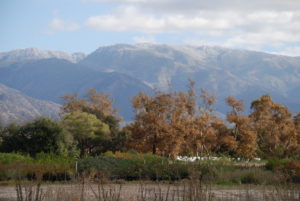Climate Ready Tribes Spotlight: Pala Band of Mission Indians
The United States is home to more than 570 individual federally-recognized Indian tribes. Each one of these distinct Tribal nations is facing the challenge of adapting to the effects of climate change. Tribes are disproportionately impacted not only by the environmental consequences of climate change, but also by the impact to traditional knowledge, cultural practices, and community health and wellbeing. Tribes are on the front lines, and are facing the climate change fight with fewer resources but greater challenges than non-tribal communities.




At the Pala Band of Mission Indians, we have been fortunate to receive grant funding from the National Indian Health Board’s Climate Ready Tribes project to help support the Tribal Climate Health Project, an initiative that is focused on providing resources, training, and technical support for Tribes that are conducting vulnerability assessments and developing climate change adaptation plans. The Pala Environmental Department partnered with Prosper Sustainably, a tribally-focused environmental consulting firm, to produce a web-based information clearinghouse, in-person and online trainings, self-paced learning materials, templates, and other tools to assist tribes in creating robust and actionable climate adaptation strategies. So far, we have conducted two webinar-based training series that have included dozens of tribal environmental professionals and other stakeholders in climate change adaptation work, and reached hundreds more through in person and online participation in conferences, meetings, working groups, and trainings. All of the webinars are available on the TCHP website and on the Pala Environmental Department website, and are used as part of our self-paced training series. In 2021, with funding from the Bureau of Indian Affairs’ Tribal Resilience Program, we are working to develop a mini video-on-demand set of training tools, with brief 3-5 minute videos that will allow tribal environmental staff to learn about climate change adaptation strategies in small, easily digestible bites. We are also hoping that we can resume in-person trainings and host a long-planned climate change and tribes symposium as soon as it is safe to do so.
As the name implies, the Tribal Climate Health Project focuses on how climate change affects health and wellbeing in Tribal communities. We define health not just as physiological, but as mental, social, cultural, and spiritual. In Pala, for example, climate change is affecting the health of our oak trees, making them more susceptible to drought stress and injury from invasive pests. This, in turn, affects the production of acorns, which are a traditional subsistence food that is still important for special occasions. When people can’t collect acorns and make wiwish, or acorn mush, that has an impact on psychosocial wellbeing and can cause stress and grief about the potential loss of important cultural traditions and associated values.
In response to climate-related emotional and cultural stress, the Tribal Climate Health Project produced a psychosocial resilience framework that Pala and other Tribes can use to tailor adaptation responses that are sensitive to the unique needs and values of individual communities. Our hope is that this framework, along with the other resources available through our website, will assist many Tribes as they adapt to climate change.
Tribes are facing many complex and potentially devastating consequences from climate change. From melting ice and sea level rise making Alaska Native villages uninhabitable to prolonged drought evaporating waterholes and withering crops on the Navajo Nation to wild rice traditionally harvested by the Anishnaabe peoples disappearing from the shores of the Great Lakes, Tribes are suffering some of the worst effects; but cooperation, perseverance, and resilience are strong in Indian Country. The Tribal Climate Health Project is just a small part of meeting the challenge.
Shasta Gaughen, PhD, is the Environmental Director for Pala Band of Mission Indians. The National Indian Health Board and Climate for Health are partnering throughout November for National Native American Heritage Month to amplify Tribal leadership on climate solutions. You can learn more about NIHB’s Climate Ready Tribes Program here.